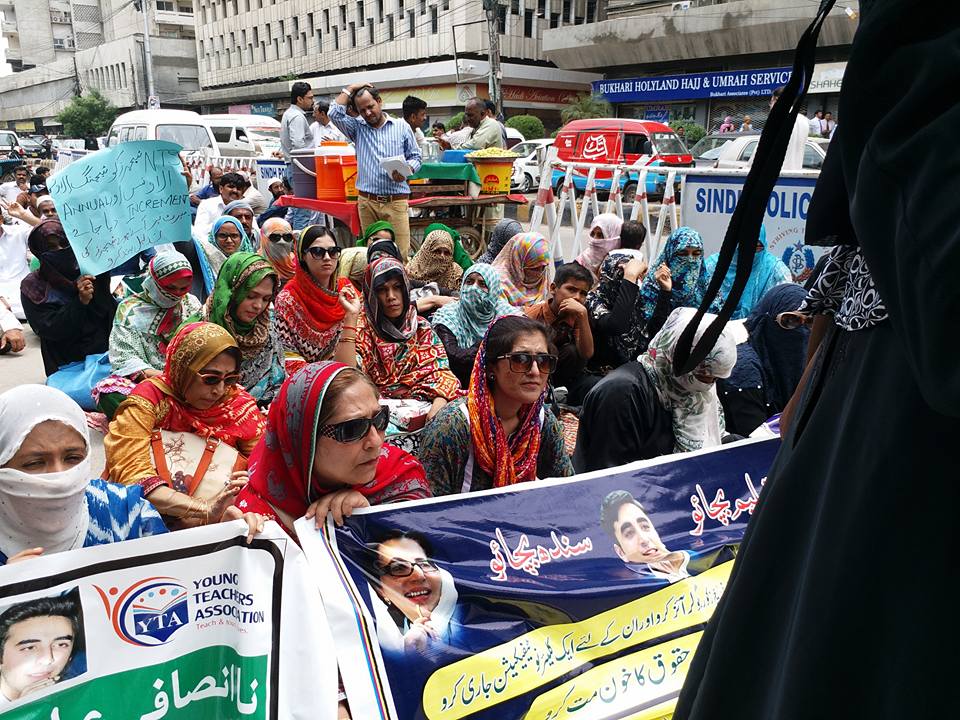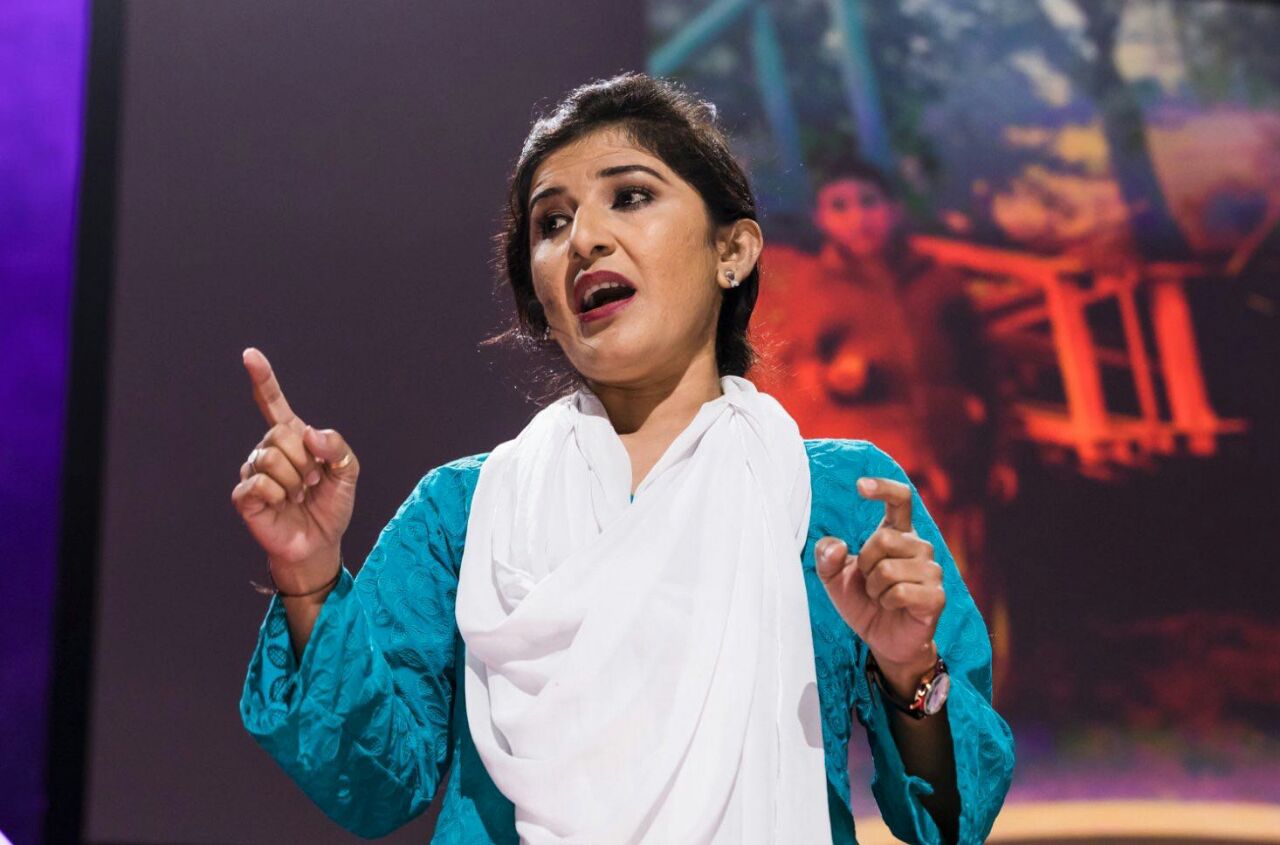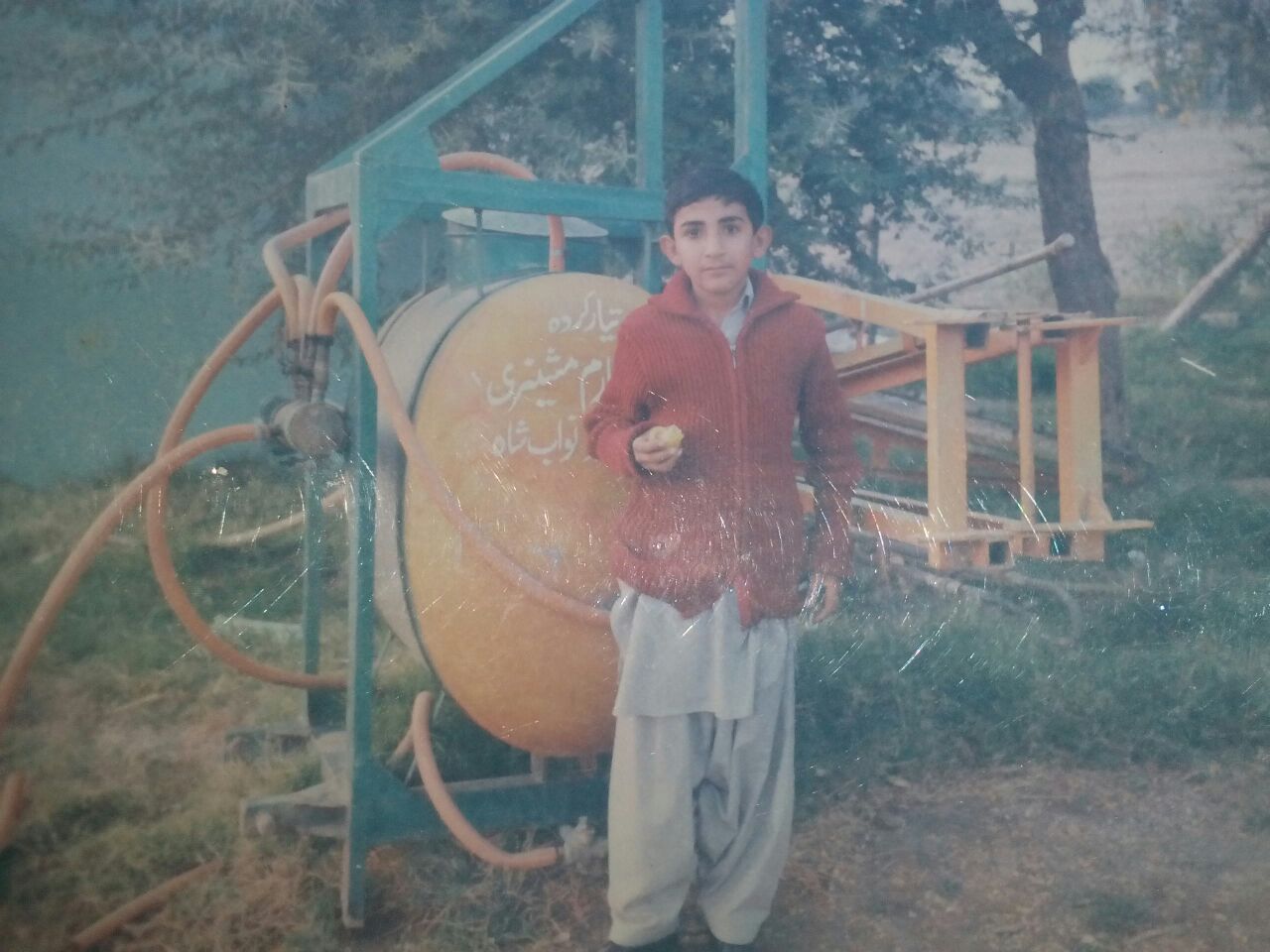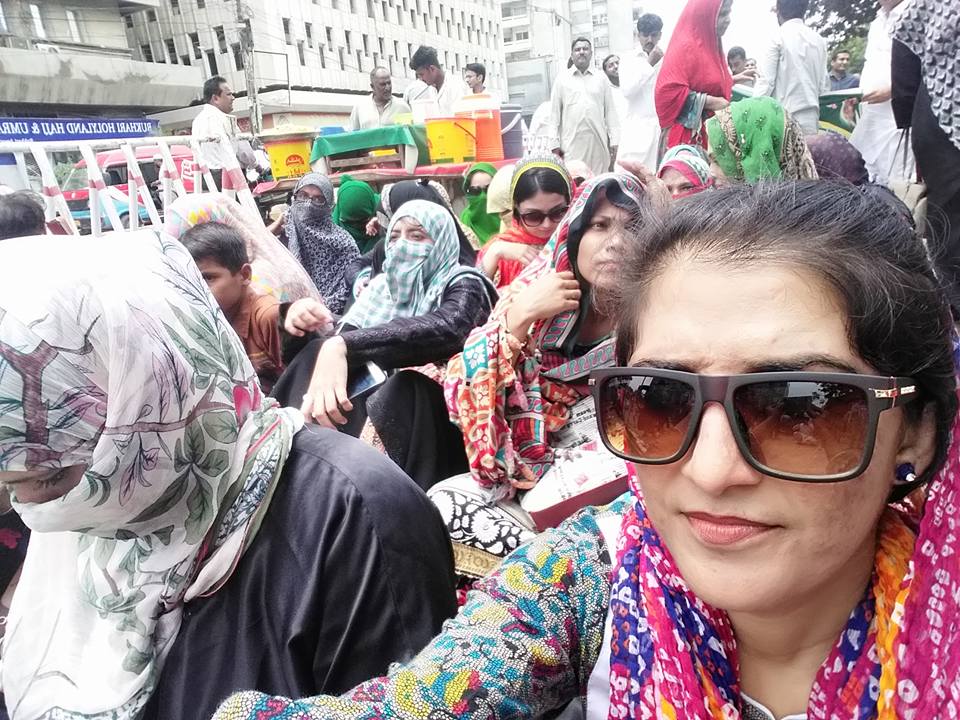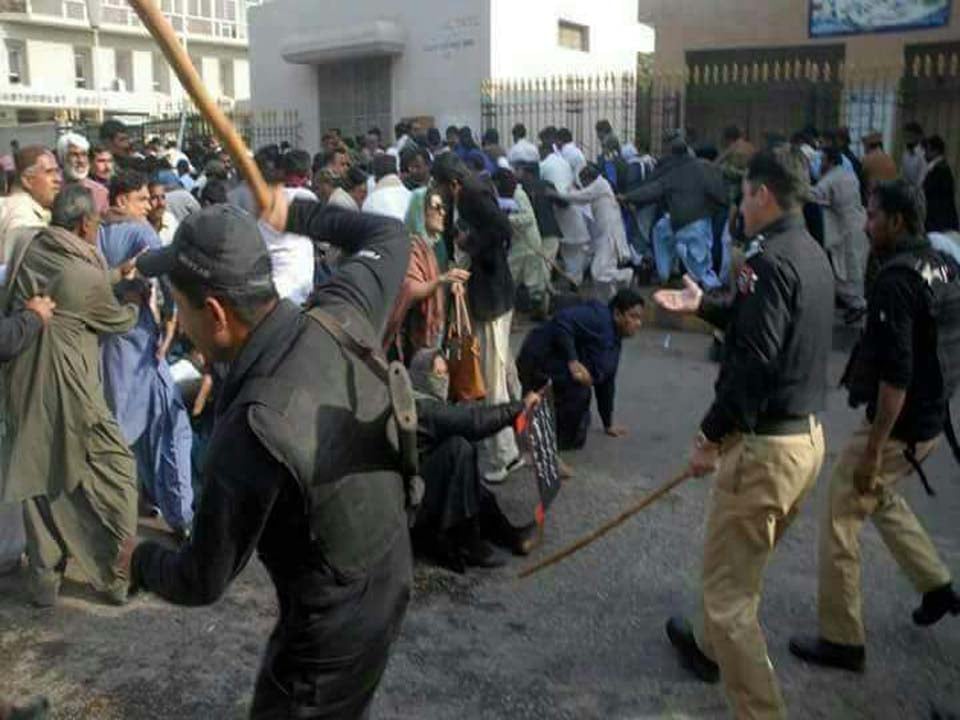Meet the woman who defied all odds for her right to an education
Shamim Mari is a fighter and a defiant one at that. Growing up she defied the strict gender norms expected of girls in her community and went to school, college and then a job – a feat that took her to the global TED Talks stage as a speaker last year.
Shamim Mari is a fighter and a defiant one at that. Growing up she defied the strict gender norms expected of girls in her community and went to school, college and then a job – a feat that took her to the global TED Talks stage as a speaker last year. Now as an adult, she is fighting the Sindh government for her right to a permanent job to be able to bring meaningful change in education for girls.
Shamim, 34, is among the hundreds of NTS-appointed contractual teachers who were camped outside the Karachi Press Club since December 25 holding a sit-in, demanding regularisation following the end of their contracts with the government. Despite being among the protesters who have had to face police torture three times already, Shamim is not fazed by batons, water cannons and tear gas. She has grown up defying authority to get her due rights.
Shamim’s story begins in the village of Abdullah Mari Goth in Mirpur Khas where she was born, the first of eight children, in 1983 into a conservative Baloch tribe where girls and women were a matter of a family’s honour and not allowed to go out of homes – even to schools or hospitals – unless accompanied by a male member of the family.
However, one of her uncles was a university graduate and was against such old-fashioned traditions. He wanted his niece to have the opportunity to study just as he had gotten and become someone who would play a role in advancing women’s education in the village.
Fortunately, she had a name that could be used for both men and women, and so her uncle took a decision that would change the course of her life for good. He decided to raise her as a boy and give her all the freedom that came with being one.
Dressed as a boy, she was allowed to step out of her house to play and study. This is how at the age of nine Shamim ended up at the village’s boys high school – the only girl studying among the scores of boys.
With the new freedom came confidence and more awareness. She began noticing everyday injustices that women faced. “When the newspaper arrived at our home, it used to pass from the eldest male to the youngest. By the time, it got to the women, the news had become outdated,” she recalled, speaking to The News while participating in the teachers’ sit-in.
When Shamim completed her 8th grade in 1996, she began fearing that this could be the end of her education because the local high school was 5 kilometres away and since the boys had bicycles they were free to go, but she couldn’t because she knew her father would not allow her to go that far alone even if she was dressed as a boy. “I can’t let you do that and I don’t have the time to walk you there and back. I’m sorry, it’s impossible” she recalls her father telling her.
This upset her greatly, but not for too long. Perhaps by some divine intervention, a relative offered to teach her the curriculum for 9th and 10th grades during the summer months and this way she was able to complete matriculation in 1998.
With more achievements came more impediments to conquer. After she had completed matric, Shamim wanted to enrol in college but her father would listen to none of it. She had to go on a three-day hunger strike to get him to agree.
Two years later when it was time for university, her education had to take a brief stop because her father had turned his attention to the education of her younger brothers who, he said, were supposed to be the eventual breadwinners of the family.
Committed to defying tribal norms and empowering rural communities, Shamim signed up for a two-year programme as a health visitor with a non-profit organisation.
“I travelled for five hours to interview for a position. I got the job but the hardest part was facing my father because when I got home, most of the relatives were already teasing him about his daughter wandering off and scaring him with talk of me crossing the border,” she said. Shamim decided to face her fear of being denied permission. She packed all her belongings and went to talk to her father.
“I went to his room and said, “The bus leaves tomorrow. If you believe in me, you will wake me up and drop me off at the bus station. If you don’t wake me up, then I’ll understand that you don’t believe in me,”” Shamim recalled.
The next morning her father was waiting outside to take her to the bus. “On that day I learned the importance of words, I learned how words affect our hearts and play an important role in our lives. I learned that negotiating is more helpful than fighting,” she said.
As part of her work Shamim travelled around rural Sindh observing the communities and their problems – lack of hospitals and schools nearby, women having several children with nothing to feed them and women having to walk three hours every day to wells for water.
As happy as she was to be doing this job and helping people, Shamim continued be a target for her villagers who continued to express their reservations about her to tribal elders and her father.
When she brought it up with her father, he suggested that she join teaching instead. She took that advice and appeared for a test conducted by the National Testing Service. She cleared it and in 2014, she was appointed to Government Girls High School Phullahdyoo, located about 45km from Mirpus Khas city, on a three-year contract and began her new career.
“When I walked in to class that first day, I saw all of these little Shamims staring back at me with dreams in their eyes. The same dreams of freedom I had in my childhood. They are eager to learn, but the school is understaffed. Girls sit hopeful, but not learning anything, and then leave,” Shamim told the audience in her talk at the TED Women 2017 Conference last November in New Orleans, US.
She couldn’t bear to see that. That is when she realised that she had found her purpose – educating girls and empowering them – and that there was no turning back.
Shamim has represented Pakistan and Sindh on various international forums. In 2013, she attended an international seminar in Bangladesh on child rights on the behalf of Plan International Pakistan, an organisation that campaigns for child development. In 2015, she delivered a lecture entitled ‘Sindh Education Status and Girls Education’ in Kenya. Last year she spoke at the TED Women conference in the US.
However, closer to home Shamim is fighting to get a permanent teaching position with the Sindh government. She had been working on her PHD in the hopes of getting a managerial position at a government school by this year. But, in November she heard that the Sindh government may not extend contracts of teachers appointed through NTS which could affect her plans of empowering girls through education. This prompted her to join the teachers’ protest at KPC. The protest has since been called off, but has left teachers unhappy with treatment they received.
Shamim says she hasn’t given up hope, but was sad about the provincial government’s attitude towards the protesting teachers who were baton-charged and beaten up by police.
Shamim is certain that she would easily qualify any new test that the government requires to continue teaching and hopes that the government would understand her and her colleagues’ plea for education and give them permanent job status for the sake of thousands of students in government schools.
-
 Benny Blanco Addresses ‘dirty Feet’ Backlash After Podcast Moment Sparks Online Frenzy
Benny Blanco Addresses ‘dirty Feet’ Backlash After Podcast Moment Sparks Online Frenzy -
 Sarah Ferguson Unusual Trait That Confused Royal Expert
Sarah Ferguson Unusual Trait That Confused Royal Expert -
 Prince William, Kate Middleton Left Sarah Ferguson Feeling 'worthless'
Prince William, Kate Middleton Left Sarah Ferguson Feeling 'worthless' -
 Ben Affleck Focused On 'real Prize,' Stability After Jennifer Garner Speaks About Co Parenting Mechanics
Ben Affleck Focused On 'real Prize,' Stability After Jennifer Garner Speaks About Co Parenting Mechanics -
 Luke Grimes Reveals Hilarious Reason His Baby Can't Stop Laughing At Him
Luke Grimes Reveals Hilarious Reason His Baby Can't Stop Laughing At Him -
 Why Kate Middleton, Prince William Opt For ‘show Stopping Style’
Why Kate Middleton, Prince William Opt For ‘show Stopping Style’ -
 Here's Why Leonardo DiCaprio Will Not Attend This Year's 'Actors Award' Despite Major Nomination
Here's Why Leonardo DiCaprio Will Not Attend This Year's 'Actors Award' Despite Major Nomination -
 Ethan Hawke Reflects On Hollywood Success As Fifth Oscar Nomination Arrives
Ethan Hawke Reflects On Hollywood Success As Fifth Oscar Nomination Arrives -
 Tom Cruise Feeling Down In The Dumps Post A Series Of Failed Romances: Report
Tom Cruise Feeling Down In The Dumps Post A Series Of Failed Romances: Report -
 'The Pitt' Producer Reveals Why He Was Nervous For The New Ep Of Season Two
'The Pitt' Producer Reveals Why He Was Nervous For The New Ep Of Season Two -
 Maggie Gyllenhaal Gets Honest About Being Jealous Of Jake Gyllenhaal
Maggie Gyllenhaal Gets Honest About Being Jealous Of Jake Gyllenhaal -
 'Bridgerton' Star Luke Thompson Gets Honest About Season Five
'Bridgerton' Star Luke Thompson Gets Honest About Season Five -
 Prince William On Verge Of Breakdown Because Of 'disgraced' Andrew
Prince William On Verge Of Breakdown Because Of 'disgraced' Andrew -
 Tig Notaro Reflects On Oscar Nod For 'Come See Me In The Good Light': 'I Was Sleeping'
Tig Notaro Reflects On Oscar Nod For 'Come See Me In The Good Light': 'I Was Sleeping' -
 Kenyon Sadiq Sets 40-yard Dash Record At NFL Scouting Combine, Eyes First Round
Kenyon Sadiq Sets 40-yard Dash Record At NFL Scouting Combine, Eyes First Round -
 Talk Show Host Drops Hint About Taylor Swift, Travis Kelce Wedding Date
Talk Show Host Drops Hint About Taylor Swift, Travis Kelce Wedding Date
